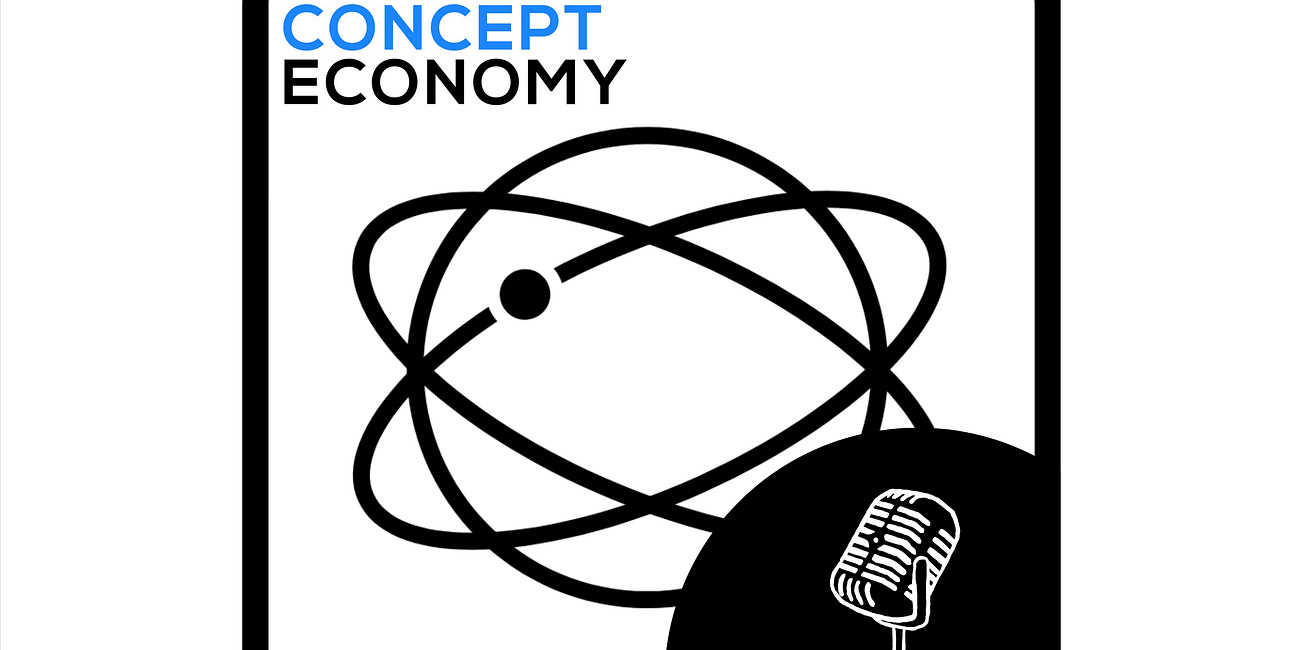Listen to the full conversation between Sam and Bill here.

I knew that the social sciences were important when I saw them leaking into my engineering degree. Maslow’s Hierarchy of Needs was presented to us as a valuable input for product development – yet it turned out that Abraham Maslow was not a mechanical engineer but a psychologist. As I’ve progressed in my career I’ve discovered that the social sciences are deeply embedded in the processes that place cutting edge technology in the hands of everyday consumers. And when it comes to our ideas about economics in particular, as Keynes himself put it, “the world is ruled by little else”.
Of course, not everybody agrees with Keynes or Maslow, so my mission is to build a broad picture of the different perspectives offered within the fields I’m studying. One author I’ve enjoyed reading is Noah Smith, and I was delighted when just a few months ago he published a recommended reading list.
Instantly, I was drawn to the section of the list marked “do not read”. There is no better way to make a book intriguing than to recommend people avoid reading it.
High on the do-not-read list was one of the most interesting books I’ve ever read – Stephanie Kelton’s, The Deficit Myth – a very engaging introduction to Modern Monetary Theory. To my surprise, the fact that Noah Smith had not read the book did not save it from being added to the do-not-read list. But Noah did have a reason for this – he’s written about MMT before.
Instead of providing a review of The Deficit Myth, Noah provided a review of MMT. It was a zinger. Here’s a brief quote that captures the tone:
“For those who don’t know, MMT is a pseudo-theory that pushes infinite government deficits without concretely specifying why deficits are safe or how they think the economy actually works.”
Noah calls in a pair of Banque de France economists (quoting economist and commentator, Jon Hartley) to turn up the heat:
“[MMT] is not a falsifiable scientific theory; it is rather a political and moral statement by those who believe in the righteousness — and affordability — of unlimited government spending to achieve progressive ends.”
For clarity, Noah acknowledges:
“I haven’t read The Deficit Myth, but I have read a couple of MMT papers, and that was quite enough to get the gist.”
Now, I’m no economist, but I have read The Deficit Myth and I couldn’t help notice a rather large problem with Noah’s critique: it’s pretty clear that major proponents of MMT such as Stephanie Kelton would not recognise their ideas in Noah’s description. To help me decide whether Noah was attacking a MMT straw man I took the matter to Professor Bill Mitchell, at the University of Newcastle.
Bill is a prolific academic and blogger and is responsible for coining the term, “Modern Monetary Theory”, so I was pretty confident he’d have an insightful take on Noah’s critique of MMT. Bill did not disappoint. Over the course of our conversation he provided a systematic overview of MMT, and we used some of Noah’s quotes as a jumping off point to explore common misconceptions about MMT. I’d like to touch on two of the most significant ideas.
MMT identifies clear constraints on government spending
Contrary to the notion of “push[ing] infinite government deficits”, Bill explained that MMT identifies very clear parameters that govern responsible government spending. As with many mainstream economic schools, inflation is a key concern. As Bill put it:
“We worry about inflation and that's why we believe there's a strict discipline on government fiscal policy.”
“If government pushes nominal spending at a faster rate than the productive capacity of the economy to absorb that spending and produce real goods and services, there'll be inflation; that's your limit. If you've got growing productive capacity, increasing population, larger capital stock, investment in machinery, equipment, etc. the growth in money is not going to be inflationary because the economy is growing in size and so is its capacity to produce real goods and services.”
This idea is not controversial – it’s an intuitive account of inflation based on demand and supply – and it dispels the myth that MMT promotes a view of the economy where governments have zero spending constraints. Responsible spending is limited by the need to avoid inflation. But it’s the factors that Bill doesn’t talk about which make his position interesting. Instead of hand-wringing about large deficits and the size of the money supply in general, Bill draws attention to the specific connection between inflation and the productive capacity of the economy.
In a word, Bill wants us to pay attention to context. Rather than assuming all increases to the national deficit are bad, MMT suggests we should be paying more attention to how the government is spending money, and whether that is creating overwhelming demand which the economy cannot service, or whether the government is strategically investing in the expansion of the productive capacity of the economy. As Bill summarises later in our conversation:
“Sometimes rising deficits are appropriate, sometimes they're not. To be able to make that judgement, you have to understand the context.”
MMT demonstrates that taxes don’t limit government spending
In shifting focus toward productive capacity, MMT academics are also suggesting that our conversations about the economy have been fixated on the wrong constraints. This is how Bill puts it:
“Mainstream economists argue that government has to raise taxes in order to spend. And if it spends more than taxes, it has to borrow from the private sector. Well, what MMT tells you is that that's nonsensical… It's like arguing that our metropolitan tram system or any of the public transport systems can run out of tickets. They obviously can't run out of tickets. What they can run out of is capacity to have people on the trams.”
Bill’s example distinguishes between the supply of government-issued money (available tram tickets) and productive capacity of the economy (available tram seats). This distinction helps us to make better decisions about where to direct our problem-solving capability.
Obsessing over ticket collection represents a lost opportunity to design a more effective tram system with more seats and better service. This is because when it comes to the ability of the transport system to provide utility, ticket collection is a secondary matter. Transport system architecture is where the key risks are mitigated and maximum capacity is defined.
Likewise existing debates on government spending which pretend that government is dependent on taxation distracts from the main game of improving our economic diversity and building a nation in which families and entrepreneurs can flourish. These problems won’t be solved by recalibrating tax brackets (though that may be part of the solution) but by developing a better economic architecture.
The idea that government spending is not limited by taxation is shocking at first. And it’s easy to see how this concept can be twisted into a claim that MMT is advocating “unlimited government spending”. Unfortunately, this misrepresentation short-circuits discourse on the most interesting and valuable ideas that MMT has to offer. Taxes matter and they’re a useful tool to help us achieve our goals, but it’s the overarching structure of the economy that should occupy the focus of our discussions.
What’s really at stake?
One quote from Bill drives home the controversial implications of MMT. He’s talking about Australia, but the point applies to any country with sovereign control over their currency, such as New Zealand, the UK, Canada, and others.
“The reality is that the Australian government can buy whatever is for sale in the Australian dollar whenever it wants to, including all idle labour. It can always ensure there's very low unemployment, just people moving between jobs. The implication of that statement is that whenever there's mass unemployment, that's a political choice. It's not a financial necessity. It's a political choice.”
Bill is here explaining the reasoning behind the MMT Job Guarantee – a policy proposal which suggests that it is possible to maintain a very high level of employment without increasing inflation, by creating government-funded jobs in local communities that do not compete with the private labour market. This is dramatically different to popular approaches to handling unemployment. The most radical idea is Bill’s assertion that mass unemployment is a political choice.
For the past 40 years, many advanced democracies have implemented programs of fiscal austerity which cut spending to welfare services relied on by lower and middle class workers. At the same time, generous concessions were provided to some of the most powerful private entities in the corporate and financial sectors with the promise that economic benefits would eventually “trickle down”. These deeply inequitable policies were made possible by portraying austerity as an unavoidable solution to pressing economic problems, such as the stagflation of the 1970s and 80s. Margaret Thatcher was highly influential in establishing this brand of neoliberal politics and the infamous tag-line associated with her Prime Ministership was, “There is no alternative.”
MMT is an existential threat to the neoliberal narrative because it plainly identifies an alternative strategy for managing the economy. It attacks the premise that national budgets are subject to the same constraints as household budgets and demonstrates that policymakers have a far wider range of options at their disposal than the public has been led to believe. As commentators such as Alan Kohler have identified, throwing open the possibilities for fiscal policy will create new challenges. But unlike the challenge of justifying government expenditure based on taxation, these challenges result from confronting reality instead of deliberately misrepresenting it. Surely this is a better basis from which to tackle the hard problems of economic inequality resulting from decades of neoliberal policy.
Noah Smith has written about wage inequality in the US, and the mysterious phenomenon of stagnating real wages. And while he argues that historic wage stagnation may be due to “a patchwork of causes” he readily identifies the need to “reduce inequality and create a broad-based middle class in which most of the American populace feels that society affords them dignity”.
I believe MMT can play an important role in re-establishing this middle class, by placing the productive capacity of the economy at the centre of our policy debates and demonstrating that there is an important role for governments to play: both in stabilising competitive markets, and enabling communities and individuals to perform productive work from which the private sector cannot derive a profit. This is far more than a “political and moral statement”. It is a practical reframing of economic policy based on the observation that a national budget does not function like a household budget, and that strategic government deficits can strengthen the economy rather than undermine it.
In another article, Noah Smith critiqued MMT for a lack of concrete models. The same scepticism is there but Noah makes some interesting points which deserve better engagement than this post can provide. A number of the questions Noah raises are ideas I’d like to explore further.
There’s one point this critique does not engage, however, and that’s the potential for MMT to radically re-write the agenda for public debate about government spending by unpacking the implications of monetary sovereignty and dismantling the pre-occupation with balanced budgets. That’s what has gripped me since my conversation with Bill Mitchell, and that’s what made The Deficit Myth a great read. At the very least, I think this warrants further consideration.
If you’re reading, Noah – I’d love to hear your thoughts.
Listen to the full conversation between Sam and Bill:
"The truth about the budget" with Bill Mitchell
We’ve been told that the federal budget is like a household budget. But what if that’s not true? What would economic policy look like if there were no financial constraints on government spending?



Cam Murray also had a great post about MMT which touches on similar points to yours https://www.fresheconomicthinking.com/p/finding-the-money-can-a-film-about